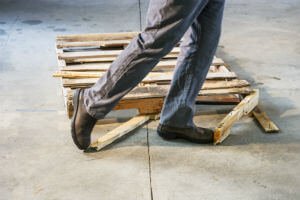 If you were injured in a slip and fall accident on someone else’s property, you might be wondering if the property owner is liable for the damages you have suffered.
If you were injured in a slip and fall accident on someone else’s property, you might be wondering if the property owner is liable for the damages you have suffered.
The answer is that it depends on whether the property owner breached his or her duty of care and whether that breach directly caused your injuries.
A duty of care is defined as a legal obligation to act with the same level of caution toward others as a reasonable person would if he or she were in a similar situation.
In slip and fall cases, the level of caution a property owner owes to someone visiting his or her property is determined by the visitor’s legal status when he or she enters the property.
In Texas, there are three legal statuses for people who enter someone else’s property, including:
Invitees
An invitee is someone who enters the owner’s property with the owner’s express or implied permission for the benefit of both parties. Examples of invitees include employees and customers of retail stores.
Property owners have a duty of care to either eliminate unreasonably dangerous conditions they know about or provide adequate warning to invitees about these conditions. This obligates property owners to conduct regular inspections to discover unreasonably dangerous conditions.
An example of an unreasonably dangerous condition would be a concealed danger that the invitee is not expected to know about, such as a weak spot in the carpet that people cannot see that can easily cause people to lose their balance when walking over it.
Property owners are not legally required to eliminate or warn about hazards or dangerous conditions that are open and obvious to invitees. This is because there is an assumption that invitees will take reasonable steps to protect themselves against obstacles and other hazards they know about.
This is why one of the common defenses against slip and fall claims from invitees is that the invitee knew about the danger and did not take the proper steps to avoid an injury.
Licensees
These are people who enter a property with the owner’s permission, but are doing so for the benefit of someone other than the owner. Common examples of licensees in Texas are postal workers and social guests, such as people who go to another person’s house for a party.
An employee could also be classified as a licensee if he or she enters a workplace without the employer’s knowledge and for a purpose that does not benefit both parties.
The duty of care owed to licensees is similar to what is owed to invitees. However, property owners do not owe licensees a duty to inspect the premises for dangerous conditions.
Trespassers
This designation refers to a person who enters a property without any legal right to do so, whether that right is expressed or implied. Examples of trespassers include customers who were asked to leave a business, criminals or people who walk into a homeowner’s yard.
In most cases, the only duty of care owed to trespassers is to avoid injuring them through willful, wanton or gross negligence. This includes the duty to warn potential trespassers about extremely hazardous conditions.
Child Trespassers
Property owners can be held liable for injuries to child trespassers that were caused by highly dangerous artificial conditions.
If you are filing a claim over this type of situation you must establish these five elements to have a chance of success:
- There was a reasonable expectation that the property owner knew or should have known that the place with the artificial condition was one where children were likely to trespass.
- The owner should have known the condition presented an unreasonable risk of death or serious injury to children.
- The child did not discover the condition or realize the danger because of his or her youth.
- The burden of eliminating the danger was small compared to the risk to children.
- The property owner failed to exercise reasonable care to remove the condition or protect the child.
Contact Us Today to Find out if You Have a Case
Our Fort Worth based personal injury lawyers have detailed knowledge of state laws governing these claims. We know how to collect evidence to help establish the property owner’s liability for your injuries.
We offer a free, no obligation consultation and do not charge legal fees unless we recover fair compensation.
Call (817) 920-9000 or fill out a Free Case Evaluation form.